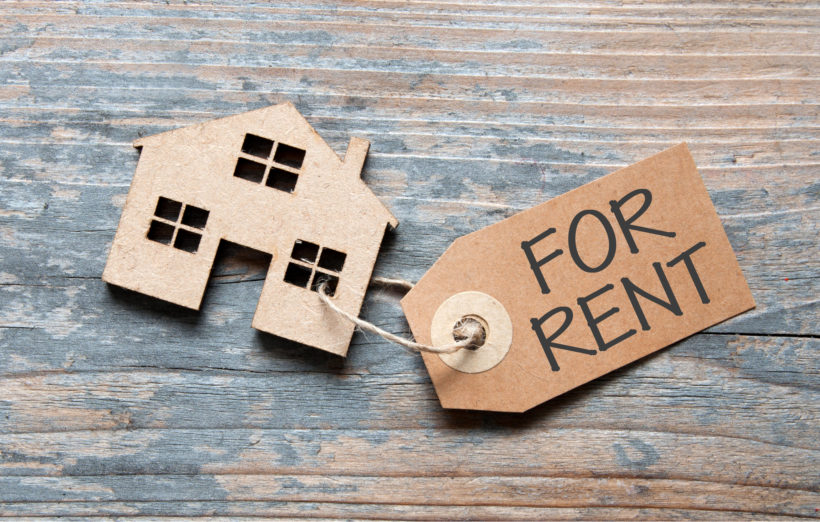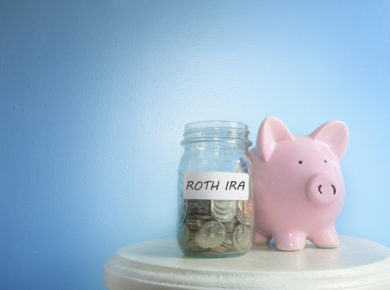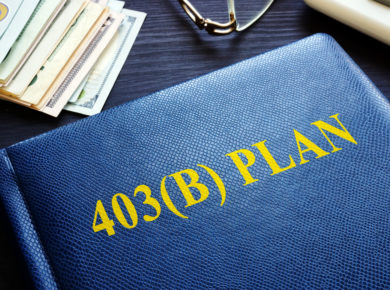Real estate is one of the proven paths to financial success. Property investors are able to enjoy continuous streams of income from their properties, allowing them to live the lifestyle they want, rather than punching a clock in a regular 9-to-5 job.
If you’re ready to embrace that freedom and flexibility in your own life, there’s good news. It only takes one step – buying your first rental property and then finding renters.
However, that single step can be quite the doozy, particularly if you’re new to the whole real estate investment scene. The good news is that a little information can make the process a great deal simpler and less confusing. We’ll cover some of the most vital things for you to know below.
Table of Contents
- Part 1: How To Buy Your First Rental Property
- Part 2: Preparing Yourself to Be a Landlord
- Part 3: Tips for Becoming a Great Landlord: From Lease to Move-Out Inspections and More
- Understand the Law in Your Area and Consider Working with an Attorney
- Keep the Lease Clear
- Provide Information on the Unit or Home
- Right of Entry Information
- Do You Allow Pets?
- The Deposit
- What You Do and Don’t Cover
- Are There Any Restrictions?
- Explain in the Lease What Happens When It is Broken
- Go Over Everything with the Tenant
- Dealing with Evictions
- Move-Out Inspections
- Tips for Being the Best Landlord Possible
- Consider a Property Management Company
- Continue to Grow
Part 1: How To Buy Your First Rental Property
In the first part of our guide, we will cover how to find and buy your first rental property, and provide some tips on what you should prioritize. In the second part, we will discuss the steps to take as a new landlord. Finally, in part 3 we will give you tips to succeed as a landlord.
Stick Within Your Means
Investing in real estate requires that you have money with which to invest. That requires you to do several things. First and foremost, you need to pay down any existing debt you might have. Yes, debt can be a part of an intelligently designed investment portfolio, but new property investors need to avoid that weight.

Once you’ve paid down as much debt as you can (school loans, unpaid medical bills, etc.), it’s time to save up for a down payment. You’re going to need a mortgage, and you’ll want the best terms possible.
That usually means putting at least 20% of the purchase price down. Of course, that means figuring out exactly how much you can afford. For property investors, this requires different considerations than what first-time homebuyers will need to think about.
For instance, in addition to how much you can afford in a monthly payment, you need to think about ongoing rental property owner responsibilities. These will include the following:
-
Maintenance and upkeep costs
-
Taxes
-
Insurance
-
Repairs
-
Marketing costs
In general, you can count on spending between 35 and 80% of your gross operating income on operating expenses for the property. However, most property owners find it simpler to use the 50/50 rule, which means that you simply assume that you’ll spend 50% of your monthly property-related income on property-related costs.
Once you’ve figured out your rough budget, you can move on to the next step, which is determining what sort of funding you’re going to use.
Funding Options
As a quick tip, during your debt pay-down period, make sure you keep an eye on your credit score. It needs to be as high as you can get it so you qualify for the best interest on your loan. Now, speaking of loans, you’ll have a range of options.
For most property investors, a fixed rate loan is going to be the better option, as it provides predictability when it comes to your monthly payments. However, you can choose either a 15-year or a 30-year fixed rate loan. Which is better? That really depends on your goals.

A 30-year fixed rate loan is the better option for property investors who plan to hold onto their rentals for the long term, and who want the lowest possible monthly payments. On the other hand, a 15-year fixed rate loan can be a great fit for those who want to limit the amount they pay in interest over the life of the loan and are willing (or able) to make larger monthly payments.
Of course, your choice of lender will have a major impact on your overall experience. Like any potential homeowner, you should shop around for the right rates and terms. However, do it smartly so you don’t unnecessarily ding your credit score.
Do some preliminary research by determining the rates each lender you’re offering might be willing to extend, and then speak with a rep on the phone (or in person) to make sure that they’re happy to answer questions, and that you’re comfortable with them. To minimize damage to your credit score, keep your mortgage shopping confined to a single 30-day period.
Ways to Save
You’ll find a number of tax credits available to property investors that aren’t on offer for regular homeowners. You’ll get the regular write-offs that all homeowners enjoy, but you can also write off other things, including the interest of your loan, the costs of repairs and other business-related expenses. Investing in upgrades and renovations within the home allows you to take advantage of depreciation down the road.

These cash-saving tools can make a big difference in your overall rental ownership experience, and it’s vital that you maximize them. Work with a trusted financial advisor or CPA to ensure that you’ve got all your I’s dotted and T’s crossed.
Who Owns the Property?
Before making a final decision on a property to purchase, or even on a lender with which to work, you might want to consider who will own the property. Joshua Kennon, writing for The Balance, notes that it’s often not a wide idea to buy rental properties in your own name.
Rather, he points out that forming an LLC or limited partnership and then putting the property in that entity’s name might be the best option for risk mitigation. This can help ensure that the worst-case scenario, if the investment does not pan out, is that you lose your initial startup capital, rather than putting your personal financial assets at risk.
Finding the Right Property
Finding the right property is the single most important part of the equation. You could have the perfect mortgage loan lined up, your debt all paid down, and your credit score as close to perfect as it can be, and yet still not be successful if you don’t have the right property. What makes “the right” property?
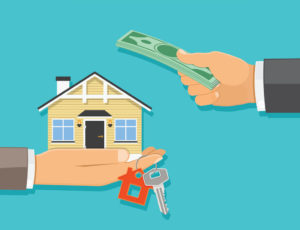
Really, there’s no one-size-fits-all rule here. It hinges on things like your income needs, the area in which you’re interested in owning rental property and a great deal more. However, there are some important tips that can help to make the home-shopping and comparison process easier.
- Work with a Real Estate Agent: Yes, working with a real estate agent will increase your costs, but the payoff is more than worth it. Having a seasoned expert on your side reduces the amount of time and effort you need to put in yourself, but can also help ensure that you’re able to discover some of the true gems of the area in which you’re interested in purchasing.
In many ways, choosing the right realtor is as important as choosing the right rental property or the right loan. Take your time. Do your research. Ask around for recommendations. Speak with multiple realtors in person or on the phone to get a feel for them. However, make sure that you’re only considering realtors who have extensive experience working with property investors. Your needs are drastically different from a traditional homebuyer.
- This Is a Business Decision: Buying a property can quickly get personal. Your own tastes, preferences, and wants will start to creep in. It’s essential that you not allow that to happen. This is a business decision, pure and simple. You’re not buying a home for you and your family to live in, but a home that you’ll rent out to others. So, you need to divorce your personal preferences from the process. Look for a property that has the features and amenities that matter to your target audience.
Of course, in order to do that, you need to know who your idea tenant might be. Are you considering young families? College students? Young professionals? Mid-range consumers looking to rent while shopping around for a permanent home?
- What You’re Willing to Invest: In addition to ensuring that you’re working with a reputable, experienced realtor and that you know your target audience, you also need to know how much work you’re willing to put into a property. How much time are you willing to spend remodeling? How much time will you spend on repairs? Do you have the time, tools and skills to handle DIY projects? Would you prefer something more turnkey?
What to Look for in the Ideal Residential Property

Again, there is no single “perfect” property for every real estate investor. What’s right for you might be very wrong for someone else. What’s right for that investor might be a significant burden for you. With all that being said, there are a few things to look at that will have an impact on your property investment experience, and that do apply across the board.
-
Property Taxes: How much will you be on the hook for in terms or property taxes each year?
-
School District: What’s the school district in the area like? This will play a major role if your ideal tenants are young families with children.
-
Crime Rate: Obviously, the crime rate is a major consideration, but it can be easily researched so you can avoid high-crime areas.
-
Travel Ease: How easy is it to get to the area, and from there to others? What sort of access is there to bus lines, trains, or interstates?
-
Employment: What is the general employment situation in the area? Are jobs growing or is the economy shrinking?
-
Amenities: What’s available nearby that might attract tenants? Shopping malls, parks, movie theaters? Is the area walkable?
-
Vacancy Trends: What is the current vacancy situation like in the neighborhood? How has it changed over time? Is there a seasonal cycle (such as in a college town)?
-
Rents: What is the average rent for the area? How might that change over the coming years?
Closing the Deal
Closing the deal on your investment property will be very similar to buying a single-family home in many ways. One of those is that you’ll need an appraisal and a home inspection. If the appraisal comes back over your offer on the property, you can make a new offer, withdraw your own, or even challenge it if you think there’s something off.
The home inspection is just as important – this can be a “make or break” element. Are there major systems or features that need work or replacement (the roof, the HVAC system, the foundation)? If so, is it feasible to buy the property for less (to account for the costs of repairs or replacement), and then handle the issues, or would it be better to look for another property completely?
Setting Rent
Once you’ve purchased a home, you’ll need to set your rent. Of course, you should have a very good idea of what you’ll be able to charge for rent before buying a home, as your monthly rents will be your bread and butter, and what allows you to actually make your mortgage payment. It will also have to offset maintenance costs (lawn mowing, water heater replacement, drywall damage, etc.).

Setting rent isn’t all that tricky. It just requires knowing what other similar properties (called comps) are going for in the immediate area. You’ll also need to factor in other costs, such as the amount of your mortgage payment, insurance and other out of pocket expenses. Ideally, you’ll see positive cash flow from your property, with somewhere between 8% and 15% return.
Of course, if you have made significant upgrades to the property, those can be used to bump up your rental rate, but make sure you don’t go beyond what the market will bear. Otherwise, you’ll find yourself with longer vacant periods and less return on your investment.
Finding Renters
Finding renters is a challenge for all property investors. Marketing your investment property has gotten simpler, though. You can go with a property management firm if you want a truly hands-off experience, but that will drive up costs. You can (and should) also list your property through local newspapers or real estate-specific publications in the area, use Zillow, and even take advantage of social media platforms like Facebook. Of course, you can also work with a realtor here.
With that being said, it’s crucial that you have a thorough vetting and screening process in place. Criminal background checks, credit checks, and personal reference checks are just the beginning. Be choosy about whom you allow into the property, as a bad tenant can quickly turn what should be a dream come true into a nightmare.
In Conclusion
In the end, buying and then putting a rental property on the market is a big decision and not a process that should be rushed into, particularly if you’re a new property investor with little or no experience. Take your time, work with a seasoned real estate agent, and make savvy business decisions that help ensure growth and profitability.
Part 2: Preparing Yourself to Be a Landlord
So you’ve bought a rental property, or are planning to rent out a home you own, there are many steps along the way to being a landlord. If you haven’t realized it already, now is the time to remind yourself that being a landlord is being a small business owner. You (the business owner) are offering a product and a service (a home as well as maintenance and other services) to a customer (your renter). Just like any other small business owner, you need to have a complete business plan created to guide you through every step of the process.

In this guide, we’ll discuss all the things you need to do after you’ve purchased your rental property and are thinking “Ok, now what?”. We’ll go over how to prepare the house legally and physically for renters, whether you should use a property manager, understanding the fundamental laws and rights that you and your tenants have, how to advertise your rental home, how to screen applicants, and more. We’ll also include a move-in checklist that will help you have a successful first day on the job.
Getting a Property Rent-Ready
If you’ve purchased a brand new property, you won’t have as much to worry about when it comes to preparing the home for renters. Usually, the previous owner or contractor that built the property will have made it move-in ready.
However, if you are using a property you already own, or you bought a property at auction or through some other means, you may need to check that certain things about the home are prepared for renters. This may include:
-
Checking that all the electrical outlets work, making sure the plumbing is in good repair, and being sure that all the windows and doors have working locks.
-
Replacing anything broken, like floor tiles, cabinets, fixtures, and so on.
-
Ensuring that the home has working fire detectors and CO2 detectors.
-
Ensuring that any appliances you include with the rental are in working order.
-
Ensuring that any potentially dangerous elements are made safe, such as wobbly stairs or lofts without safety rails.
-
Overall, making sure that the property is safe for tenant use and is legally considered livable. For example, a basement suite may need to meet specific laws set by the local municipal affairs office to be considered legal to rent.
Another thing you’ll need to consider is home insurance before renters move in. The kind of home insurance you get for a rental property is different than the kind you’d get for a home you live in. Primarily, the difference is that it covers things like damage done to the property by an evicted tenant, for example. You can often get a bundled price on your rental property insurance through the company that ensures your own home.
You may also want to consider whether or not you’ll require tenants to carry renter’s insurance. This insurance covers the renter’s property, like furnishings and belongings, should there be any damage to the home (such as a fire or a flood). This can be an excellent way to ensure that you aren’t ever held liable for events like these. If you don’t intend to require this, be sure to have a clause in your lease stating that you are not responsible for damage done to the tenant’s belongings, in any case.
Should You Use a Property Manager?

Now that your property is ready to be rented out, you should consider whether you intend to handle the entire business yourself, or if you want to go through a property manager. There are pros and cons to both choices. If you simply want to create a passive stream of income without the work of managing the property, hiring a company or professional may be the way to go.
Property managers act as a surrogate landlord, so you never have to come into contact with the tenants at all. They do things such as:
-
Screen applicants
-
Create leases or agreements and have them signed
-
Collect rent
-
Arrange any maintenance
-
Handle contact with the renter, including complaints, maintenance requests, etc.
-
Pay bills, such as paying property taxes on the property
-
Enforcing all your rules for tenants
-
Advertising the rental unit
-
Doing all the move-in and out inspections
-
Keep records
-
Ensure the tenant’s rights are respected to avoid issues with the law
As you can see, a property manager can be of enormous value. Their services do come at a cost, but the tradeoff is that you can have basically no responsibilities to handle the property in the meantime. You’ll just get a paycheck when the rent comes in. This is a popular choice for landlords who have multiple properties and can’t deal with all the duties of various properties themselves.
If you only have one rental property, it may be a better idea to act as the landlord at first, simply so that you can learn how to be a landlord, in case you ever need to fire a property manager for any reason. It’s also not as likely to be as cost-effective with just one property.
The last item on the list above mentions tenant rights, and it is important to note that if you don’t intend to hire a property manager, you should be aware of what the local laws are in your area for tenants. For example, some states allow landlords to evict tenants for any reason with a 30-day notice; others require a much lengthier process. Be sure you are aware of any laws that pertain to tenant rights so that you don’t open yourself up to being sued.
Advertising Your Rental Property
So now, your property is ready, and you’ve decided to either handle the landlord process yourself, or you want to work very closely with your property manager. The next step is actually attracting some potential renters.
It’s time to think about how you will advertise. That means deciding where you should advertise (the paper? Facebook? Craigslist?), and how you should make the house look (via staging and outdoor landscaping) to attract the kinds of renters you want.
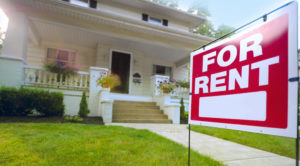
A lot of this depends on the area where the property is located. If the neighborhood is primarily home to college students and young professionals, you’ll want to play up the amenities and nearby things that are easy to walk to. If the neighborhood is primarily home to families with children, you’ll want to include information about nearby schools, crime rates, and family activities that go on nearby.
For the property itself, a young professional may be more interested in the fact that the home has its own wet bar, whereas a small family may be more interested in the fact that there is an additional room that could be a playroom, office, den, or eventual extra bedroom.
For many rental properties, staging is a waste of time. If you have applicants lined up for your property, spending time moving staging furniture in and out could be a hassle. But if you haven’t found any applicants yet, consider adding just a few pieces in the main spaces to give potential renters an idea of how the property could be home. One way that many landlords do this is with virtual mockups on websites of the property with furnishings in it.
Be sure that your advertisement includes high-quality photos, and contains information such as:
-
Rental cost and the average price of utilities if known
-
The square footage
-
The security deposit amount
-
If you allow pets or smoking
-
All the incentives that are included, like access to a fitness room, or free parking
-
Any information about the surrounding area as it pertains to your ideal renter
-
Your contact information
If you are using a rental property manager, be sure they are aware of what kinds of renters you are targeting so that they can also build advertisements around this profile.
Screening Applicants
The next step after getting interested applicants is to screen them and then agree to the lease together. In the next segment in this series, we’ll go in-depth on how to create the perfect lease. So let’s talk about how to screen applicants, and what types of things you should be looking at to determine who would make a great tenant.
Screenings allow you to see many things about a tenant. The first thing is their income and employment history information. This assures you that they can afford the rent. Stable work history with their current employer is a great sign; it means they aren’t as likely to be out of work soon.
The next thing is their rental history. If they have frequently been evicted in the past, this could mean that they have issues following rules or paying their bills on time. You can also access their credit information. This will help you see that they are responsible for paying their debts and bills on time.

Finally, your screening process should also include a call to references. Many landlords ask for previous landlord information to use as a reference, but this may also be someone they have a debt to or their employer. Your primary objective here is to get a feel for their character. Are they someone who impresses people with their reliability, or do they lack any proof that they are going to be responsible?
Remember that no matter what kind of screening you do, you are subject to the Fair Housing Act, even as a private landlord. This means you can’t deny someone’s application on the grounds of their race, sexuality, gender, religion, and so on. You are also bound by the Americans with Disabilities Act, meaning you can’t deny someone’s application based on them having a disability. Additionally, this law also states that should your tenant have or develop a disability, you must provide reasonable accommodations (such as a ramp to use as an alternative to steps leading up to the front door).
This process can be done through a property management company, and often even if you are acting as your own property manager, you can pay a management company to handle just this part of the process. You can also use one of the many online screening services to ensure you are in line with the law and perform a thorough check.
Move-In Checklist
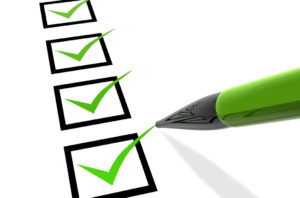
The final part of this first step to getting prepared for being a landlord is to create a move-in day checklist. This is something that helps both you and your tenant avoid unnecessary liabilities in the future. This checklist will be an inspection of the property as it is the day that the tenant moves in. It will document the exact condition of the property so that any new damage or changes after the tenant moves out were clearly caused by them. This checklist may include:
-
An inspection of each room, broken down into boxes to check each component of the room, such as all the electrical outlets, any appliances in the room, the condition of the floor, walls, and windows, and so on.
-
A column for any repairs that were approved during the tenant’s lease, so that you can track anything that happened that you were aware of.
-
Empty spaces to add notes about anything that the tenant wants to be noted before they move in, or a place to add any additional agreements you come to during the inspection.
-
A line for your signature and the tenants’ signatures.
-
A line that will gather the new address of a tenant moving out so that you know how to contact them when they leave.
Be sure to have this inspection done by both yourself and the tenant so that you both agree on the state of the property before they move in for good.
Part 3: Tips for Becoming a Great Landlord: From Lease to Move-Out Inspections and More
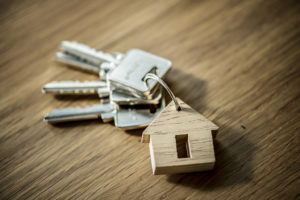
Owning real estate and being a landlord can provide you with a regular stream of income from the property that you own and rent out, and it can allow you to become your own boss. Of course, it is also essential to remember that there is quite a bit of work that goes into being a landlord if you hope to be successful. Throughout this article, we will be looking at some of the things that you will want to do to become a better landlord, and we will start with the lease.
Having a well-constructed lease can make a world of difference. You do not want to be stuck using a problem tenant, and you want to be sure you can protect your property. A great lease will help immensely. Let’s look at some of the most important things you will need to consider when you are writing up the lease.
Understand the Law in Your Area and Consider Working with an Attorney
You must always make sure you are following the law when you are creating your lease. Of course, this is sometimes easier said than done since the law differs from state to state, and even from city to city in some cases. It is essential that you take the time to learn more about the laws that pertain to your locale before you start to write up your lease agreement. It will help you understand what can and cannot be in the agreement.
Of course, most people are not attorneys and trying to understand the laws could still yield some confusion for you. Ensure that you are within the bounds of the law by asking an attorney to go over the lease once it is written. You could also work with an attorney to create the lease.
Keep the Lease Clear
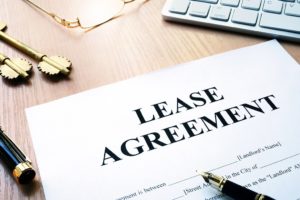
The lease should be written in language that is easy to understand for your prospective tenants. When you use terms that are confusing or phrases that have a chance to be misconstrued, it will lead to confusion and misinterpretation. Even though you might think the lease is clear, strive for simplicity. Use easy to understand terms and fully explain anything that might be misinterpreted. If you don’t, there is a chance that your agreement might not hold up in a court.
Provide Information on the Unit or Home
The lease should undoubtedly provide information on the condition of the property at the time it is being rented. It should convey that the property is being rented in good condition and that there are no damages or issues with the property. It is also a good idea to have the prospective tenants do a walkthrough of the unit with you and allow them to tell you about any areas of concern or damage that they might notice that you did not. This way, if there is additional damage to the property later, they will not be able to say that the damage had always been there. It will make sure that the tenants are getting a unit that’s actually in good condition in the first place, and it covers you in case they cause damage.
Right of Entry Information
Depending on the state, you need to give the tenants a certain amount of notice before you can legally enter the rented property. Typically, this will be 24 hours, but in some states, it can be as much as 48 or 72 hours. There may be allowances in the case of emergencies, and these should be clearly stated in the lease, as well. If you have looked into the laws in your location, as suggested, you will find the information you need for the right of entry.
Do You Allow Pets?

Many people want to own pets, or they already have pets that they plan to bring with them. You need to be very clear in your lease about whether you are going to allow pets on the property or not. Ultimately, it will be your decision, but allowing pets does often increase the number of potential renters for your property.
The pet policy needs to be explained clearly, though. What are the limits on the number or types of pets? Will there be an additional deposit? Perhaps you do not want to deal with the potential damage that animals can cause. If that’s the case, make sure that you stipulate there will be no pets allowed.
The Deposit
The lease agreement should be explicit on the amount that you will be charging each month for the rent, along with how much is expected for the deposit. State when the rent will be due and when it is considered late. You will also want to be clear about what will happen to the security deposit and when the residents could expect to receive if after moving out, provided there are no damages.
What You Do and Don’t Cover
Landlords are responsible for taking care of certain types of issues around the property. For example, taking care of repairs and replacements for fixtures, appliances that are a part of the property, and heating and cooling are typically areas that you will cover. However, it is possible to make some maintenance the responsibility of the tenant. For example, you might require that they maintain the lawn in the yard.
Are There Any Restrictions?

Do you have any restrictions on what is or is not allowed at the property? For example, the home or apartment might be in a community where loud music is not to played after 10 pm. Note this in the lease. Anything that is important and that you need the tenants to understand and agree to when it comes to living on and using your property needs to be added. Remember, it also needs to be clear.
Explain in the Lease What Happens When It is Broken
What happens if the tenants do something to break the lease? This should be written right into the lease, so there is no wondering on the parts of you or the tenant. Let the tenants know what happens if they do not pay their rent on time or if they break the code of conduct you have for your property. Typically, this will involve terminating the lease and giving the tenant an eviction notice.
Go Over Everything with the Tenant
Once you have your lease agreement written and an attorney has examined it and deemed it legally sound, you will want to go over it with your tenant. Take the time to go over each point in the lease and make sure they understand before they sign. If they have any questions, answer them clearly. This way, there are no misunderstandings.
Dealing with Evictions
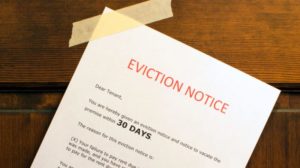
The eviction process is something that you will hope that you never have to go through. However, there is still a possibility that you will have to evict someone at some point when you are a landlord. It is never pleasant, but sometimes it is the best course of action for you to take.
Again, each state has its own rules and regulations when it comes to evicting a tenant. If you do not follow the guidelines precisely, there is a chance that you could end up needing to start the entire process over again. Instead of trying to deal with an eviction on your own, it is best to work with professionals, such as attorneys. They can advise you on what you can and cannot do.
Also, you will want to make sure that you have evidence that supports your claim for eviction. For example, you will want to bring along bank statements and any correspondence you might have had with the tenant about their failure to pay rent.
At the eviction proceedings, you will want not only the evidence, but also a copy of the signed lease agreement, copy of the notice to cease and notice to quit, bank statements, correspondence, pictures of any damage that might have occurred, complaints from other tenants, and similar information. The attorney you use will be able to let you know everything that is needed.
Move-Out Inspections
The purpose of the move-out inspection is to ascertain whether there has been any damage to the rental property when the tenants are getting ready to leave the property. The information gleaned from the inspection will be compared to the inspection and walk-through that you did with the tenant when they moved into the property. If there is any damage or issues, they will likely come out of the security deposit.
Depending on the laws in the state, the move-out inspection might occur on the day the tenant moves out or a couple of days after. By waiting until after the tenant and their belongings are gone, it will allow the landlord to get a better look at the property to see if there is any damage. The move-out inspection can help to avoid disputes that could come up.
Tips for Being the Best Landlord Possible

Naturally, you don’t like thinking about the possibility of having to evict a tenant. You want to maintain an excellent professional relationship with the tenants because you know that it will be mutually beneficial. Still, you need to be sure the tenants understand the importance of adhering to all of the policies in the lease, including paying their rent on time each month.
There are many things that you can do for new and longtime tenants to make them feel appreciated and welcome. For example, with new tenants who are also new to the area, create a printout with the names and addresses of local grocery stores, restaurants, and things to do in the area.
Provide the tenants with multiple ways to get in touch with you for emergencies. Be responsive when the tenants have questions or requests, as well, whether they are emergencies or not. If they have a problem with the plumbing or the heating at the property, get back to them as soon as you are able. Get in touch with them and let them know what you are doing to fix their situation. You will also want to consider working with a professional maintenance person, who you can contact to take care of the various things that might need fixing around the property.
Consider a Property Management Company
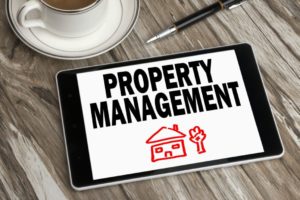
Being a landlord is a lot of work. If you have another job that takes up a lot of your time, you might find that it is challenging to keep up with your landlord duties if you have multiple properties. To make your life easier, whether you have one property or multiple that you are renting out, you might want to consider working with a property management company. The company will be able to take care of everything for you, including creating a lease, finding great tenants, and handling the rent collection and any issues that might arise.
Even though these services have a cost associated with them, you might just find that it is still a better option than trying to take care of everything on your own. Of course, if you have the time and the energy, you will find that being a landlord can be quite rewarding on many levels.
Continue to Grow
When you are first starting as a landlord, you will likely make mistakes here and there. As you learn more about the business and how to work with tenants, you will find that things do tend to get more comfortable. It is vital that you continue to learn and grow, and that you look for ways that you can make your job easier. Being a landlord can help to provide you with the financial freedom that you want. You need to be sure you are doing it the right way.
